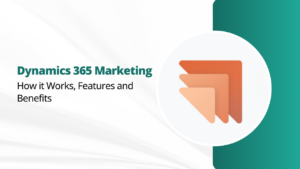CRM systems play a pivotal role in managing customer interactions, streamlining processes, and driving growth. Among the range of CRM solutions available, two prominent names stand out: SugarCRM and Microsoft Dynamics. Both offer a wide range of features, but choosing the right CRM for your business requires careful consideration. In this blog of SugarCRM vs. Microsoft Dynamics, we’ll explore the fine points of SugarCRM and Microsoft Dynamics, helping you make an informed decision that aligns with your business goals.
Understanding SugarCRM and Microsoft Dynamics
SugarCRM:
SugarCRM is an open-source CRM platform that boasts flexibility and customization as its core strengths. With an instinctive interface and compelling features, it’s designed to cater to businesses of all sizes. SugarCRM provides a comprehensive suite of tools for sales, marketing, and customer service, with the added advantage of being highly adaptable to your specific needs.
Microsoft Dynamics:
Microsoft Dynamics offers a suite of CRM solutions designed for various business segments, such as Dynamics 365 Sales, Dynamics 365 Marketing, and Dynamics 365 Customer Service. Built on the Microsoft ecosystem, Dynamics provides seamless integration with other Microsoft products, making it an attractive choice for businesses already invested in the Microsoft ecosystem.
SugarCRM vs. Microsoft Dynamics
Here are some key differences between SugarCRM and Microsoft Dynamics to provide you with a clearer understanding of their distinctions:
1. Customization and Flexibility:
- SugarCRM: Renowned for its high degree of customization. The open-source nature allows businesses to modify and adapt the CRM to their specific workflows and requirements.
- Microsoft Dynamics: Offers customization options, but not as extensive as SugarCRM. Provides a variety of pre-built modules and features, suitable for businesses seeking a quicker setup without deep customization.
2. Integration with Microsoft Ecosystem:
- SugarCRM: Can integrate with various third-party applications and platforms, but may require more effort for seamless integration with Microsoft products.
- Microsoft Dynamics: Excellently integrates within the Microsoft ecosystem, such as Outlook, SharePoint, and Teams. Offers a unified experience for users already accustomed to Microsoft tools.
3. User Experience and Interface:
- SugarCRM: Known for its intuitive and user-friendly interface. Provides a modern design that’s easy to navigate, promoting user adoption and engagement.
- Microsoft Dynamics: Offers a familiar interface to users accustomed to Microsoft products. Presents a cohesive experience for those already using Microsoft tools in their daily operations.
4. Scalability:
- SugarCRM: Highly scalable due to its customizable nature. Well-suited for businesses of all sizes, with the ability to grow alongside evolving needs.
- Microsoft Dynamics: Also scalable, catering to both small businesses and large enterprises. Modules can be added as your business expands.
5. Pricing Structure:
- SugarCRM: Often offers transparent and straightforward pricing. Can be more cost-effective for smaller businesses, making it accessible for startups and smaller organizations.
- Microsoft Dynamics: Pricing can vary based on the specific modules and features you choose. Might be more suitable for businesses with larger budgets or those looking for an integrated suite of Microsoft tools.
6. Community and Support:
- SugarCRM: Benefits from an active open-source community of developers and users, providing a wealth of resources, plugins, and solutions.
- Microsoft Dynamics: Offers robust customer support as part of its package. Provides official documentation, user guides, and assistance for users.
7. Quick Implementation vs. Deep Customization:
- SugarCRM: Ideal for businesses seeking a CRM that aligns precisely with their unique processes, even if it requires more initial setup.
- Microsoft Dynamics: Better suited for businesses that prioritize quicker implementation and leverage the built-in features and integrations.
8. Industry Specialization:
- SugarCRM: Offers a flexible platform that can be tailored to various industries, making it suitable for businesses with niche needs.
- Microsoft Dynamics: Provides specialized solutions for different industries, allowing businesses to choose a version that aligns closely with their industry-specific requirements.
SugarCRM vs. Microsoft Dynamics: Summary
Here is a table that summarizes the key differences between SugarCRM and Microsoft Dynamics:
| Feature | SugarCRM | Microsoft Dynamics |
|---|---|---|
| Price | Starting at $49 per user per month | Starting at $70 per user per month |
| Deployment | Cloud-based | Cloud-based or on-premises |
| Ease of use | Easy to use | More complex |
| Customization | Highly customizable | Less customizable |
| Features | Basic CRM features | More advanced CRM features, such as sales forecasting, marketing automation, and customer service |
| Integrations | Integrates with a limited third-party apps | Integrates with a wider range of third-party apps, including Microsoft products |
A Quick Review:
SugarCRM and Microsoft Dynamics are both leading CRM platforms that offer a wide range of features to help businesses of all sizes manage their customer relationships. However, there are some key differences between the two platforms that may make one a better fit for your business than the other. Nevertheless, there are some crucial distinctions between the two platforms that may make one a better fit for your company than the other.
SugarCRM is a cloud-based CRM platform that is known for its ease of use and affordability. It is a good choice for small businesses and startups that are looking for a CRM solution that is easy to set up and use without the need for extensive training. SugarCRM also offers a wide range of customization options, so you can tailor the platform to meet the specific needs of your business.
Microsoft Dynamics is a more complex and feature-rich CRM platform than SugarCRM. It is a good choice for mid-sized and large businesses that need a CRM solution that can scale with their growth. Microsoft Dynamics also offers a wider range of integrations with other Microsoft products, such as Office 365 and Dynamics ERP.
Ultimately, the best CRM platform for your business will depend on your specific needs and requirements. If you are a small business or startup that is looking for an easy-to-use and affordable CRM solution, SugarCRM is a good option. If you are a mid-sized or large business that needs a more complex and feature-rich CRM solution, Microsoft Dynamics is a better choice.




